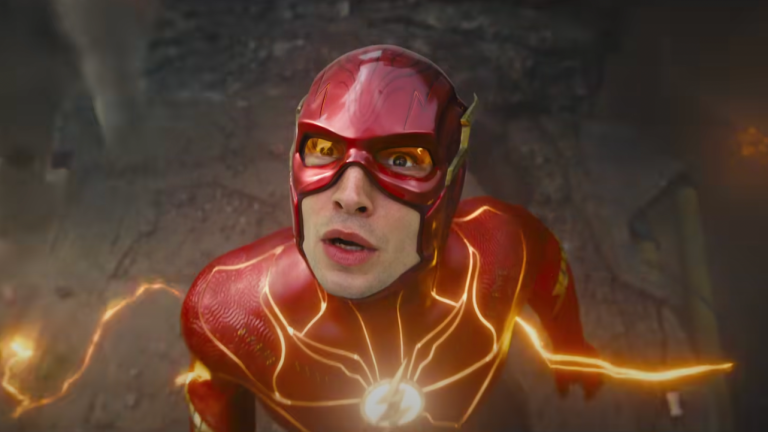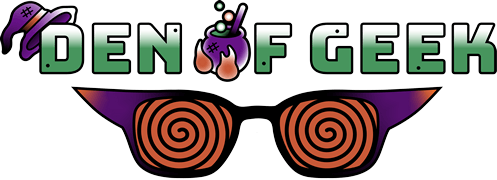The Flash Review: The DCEU Finally Gets It Right
The Flash transcends its torturous development and troubled star to become one of DC’s best movies.

In what amounts to the greatest irony in the history of the DC Extended Universe, one of the most troubled movies in the franchise has turned out to be one of its best. Nearly a decade after the film was first announced (with a 2018 release date) as part of the DCEU, and following a parade of directors and screenwriters, a pandemic, the slow-motion crash and burn of the DC cinematic universe as we know it, and the personal crash and burn of the film’s star, The Flash is finally arriving onscreen… And it’s a blast!
Directed by Andy Muschietti (It: Chapter One and Two) from a script by Christina Hodson (Bumblebee, Birds of Prey), The Flash is everything that much of the last 10 years of DC-based movies have not been: It’s fast-paced, character-driven, and, most importantly, in love with the comics and the iconic superheroes themselves. It has the crazy energy and sense of awe that is found in the colorful pages of those books, and even when it loses its way in a jumble of CG effects and confused narrative turns toward the end, it still manages to stick the landing thanks to a surprising amount of emotional and nostalgic power.
Much of that rests on the shoulders of its star Ezra Miller, who delivers not one but two performances as different versions of Barry Allen, the insecure, virginal young geek whose grudging yet also relatively enthusiastic acceptance of his life as a speedy superhero does not supersede his love for his murdered mom Nora (a touching Maribel Verdù) and his wrongly incarcerated dad Henry (Ron Livingston).
Let’s get straight to the red-and-yellow-suited elephant in the room: Miller, whose personal and legal troubles have been well-documented and are genuinely disturbing (the actor is said to have been in treatment for “complex mental health issues” since last August), is fantastic in the movie. It’s almost too much to wrap one’s head around how good they are, while knowing that the actor has been in a years-long meltdown with significant personal and possibly criminal ramifications.
It’s understandable if some potential viewers out there cannot get past Miller’s real-life foibles while watching (or declining to watch) The Flash. On a lesser level, we also get it that some fans may prefer Grant Gustin’s acclaimed portrayal of the character on TV, or just can’t see Miller in their own personal casting of this beloved, long-enduring comic book character. But in the context of this film, Miller is sensational, bringing the right balance of emotion, empathy, wacky humor, and both the joy and torment of being a superhero to both versions of Barry.
And just how do we get those two versions? As the film opens, it’s a few years past the events of Justice League and Barry, now a forensic investigator in Central City who’s also working on his father’s appeal, is on call for his mentor Bruce Wayne/Batman (Ben Affleck) whenever trouble emerges somewhere. Amusingly, however, a cameoing Jeremy Irons as Alfred lightly hints that Barry’s often third on the call list if Superman or Wonder Woman are otherwise engaged.
Describing himself as the “janitor” of the Justice League, Barry nonetheless performs heroically in the film’s terrific opening sequence, in which he saves a literal “baby shower” (as he calls it) that tumbles out of a collapsing hospital’s maternity ward and gives Batman an assist in stopping terrorists from poisoning Gotham’s water supply before zipping back to Central City in time to get his breakfast sandwich from a complaining server.
Late to work and then to court for his father’s seemingly doomed appeal, a frustrated Barry runs so fast (the VFX of his Speed Force motion is an effective mix of velocity and grace) that he breaks through the boundaries of time, discovering that he can travel back to the past. Despite an all-too-familiar warning from Bruce not to tamper with past events (“Our scars make us who we are,” Affleck intones in his brief but well-deserved encore to his own turbulent time in the cowl), Barry returns to the day of his mother’s murder and alters it just enough to save her life—but is himself then flung 10 years into the future, and to the day when he became the Flash.
His life has changed radically due to Barry’s actions, a fact that becomes apparent when he meets his 18-year-old self, an immature ne’er-do-well who still comes back from school to do laundry and whose level of impulsive cockiness rivals that of man-child Aquaman—who the elder Barry soon finds out doesn’t exist in this world.
Neither, it seems, does Superman or most of the rest of the Justice League. So when a Kryptonian ship lands on Earth and spits out General Zod (Michael Shannon), who is ready to commence his dastardly plans from 2013’s Man of Steel, Barry realizes that both he and his alternate self might be the only ones capable of stopping humanity’s destruction. He also discovers that at least one other superhero does exist in this reality: Bruce Wayne/Batman. Only he’s not the man Barry left behind.
The middle section of the film, with its references to Back to the Future (including one brilliant joke about that movie’s cast) is The Flash at its best, as Barry stumbles through this alternate universe and comes to grips with the gravity of what he’s done—all while engaging in an often hilarious yet poignant repartee with his younger self, who of course is unaware of the tragedy that has led the original Barry to this point.
Michael Keaton, who is famously returning to the Bat-cowl for the first time in over 30 years, is likewise excellent as a Bruce Wayne who needs to find his superhero mojo again (and what a thrill it is for those of us of a certain age to see the Batcave and Batmobile from 1989 in action alongside their owner). And this return is just the opening gambit in what eventually becomes a steady stream of DC cameos from the past, although they’re mostly confined to one extended climactic sequence. It’s Keaton, however, who gets to reprise his role in a meaningful way, providing him with the conclusion to his arc much as Spider-Man: No Way Home provided Tobey Maguire and Andrew Garfield with theirs.
Less impressive is the arrival of Kara Zor-El, aka Supergirl. She is portrayed effectively and powerfully by Sasha Calle in a scintillating feature debut, but Kara doesn’t get the screentime she deserves. Meanwhile the even later emergence of another character might not be made clear enough for non-fans, especially since they arrive at the tail end of the film’s mind-exploding trip through the DC past and the lengthy climactic battle.
Like so many superhero movies of the past few years, The Flash does get bogged down in its final act, with the heroes dangerously close to getting lost in the usual CG sludge, and the battle itself set against a literally featureless desert background with no one else around. The explosions and Barry’s reality-bending attempts to keep changing history pile up at an alarmingly fast rate, threatening to send the whole movie over a cliff of incoherency, but it’s pulled back from the brink by an exceptionally emotional coda—with Miller once again outdoing themselves—and the sense that the film is giving a heartfelt tip of the hat to all the DC permutations that have come before.
Heart, humor, genuinely likable characters, and a true affection for the source material from the director and screenwriter. These are elements that have surfaced only sporadically in the DCEU over the past decade or so, but are generated here with results that are immensely entertaining. Even if the MCU and Sony’s own recent Spider-Man: Across the Spider-Verse have beaten DC Films to the multiversal punch, the theme of coming to terms with the past and moving forward doesn’t come across as shopworn as it might have, and could be relevant to the real-life drama surrounding the film.
It’s a shame that Miller is not likely to reprise their performance in future DC endeavors, but the actor needs to repair their own life and make reparations to anyone whose lives they’ve damaged before even thinking about restarting their career. Nevertheless, the actor does get one final, perfect line, as the film ends on a joke that simply blew the audience at our screening right back in our seats. And yes, there is also a post-credits scene that hints that this version of the DC universe is not quite done yet. But even if it was, The Flash is one hell of a high note to speed into history on.
The Flash opens in theaters on Friday, June 16.

